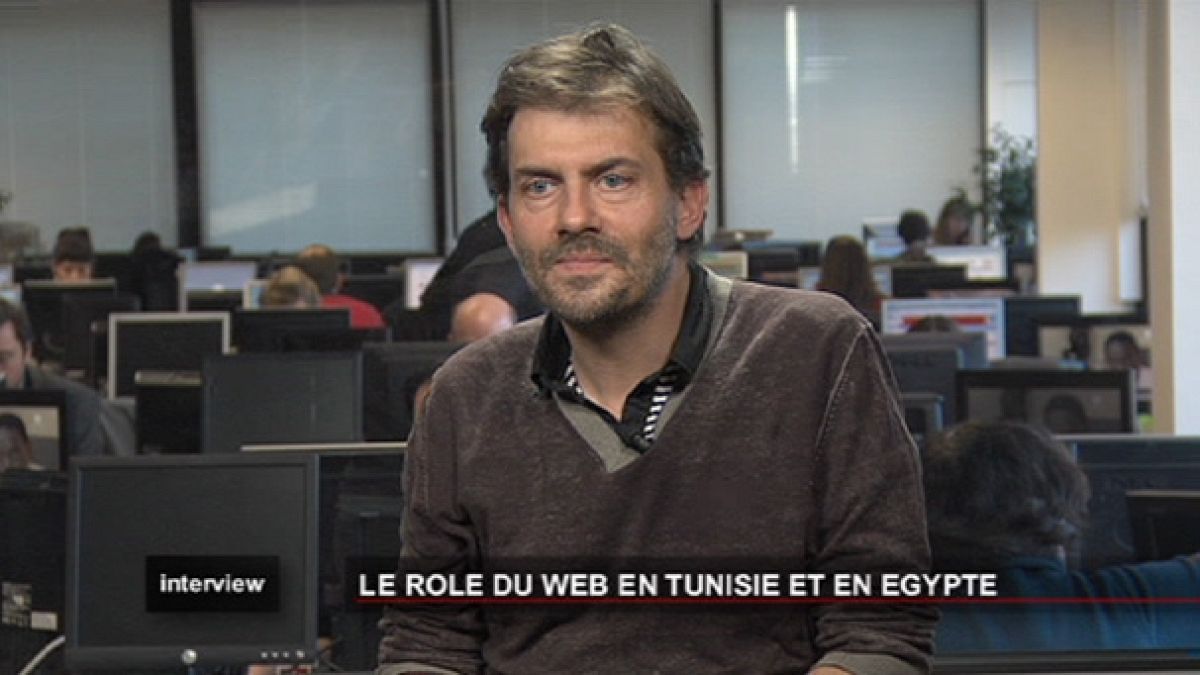In the light of the recent revolts in Tunisia and Egypt, the internet has been championed as one of the driving forces behind social change. euronews spoke to French sociologist Dominique Cardon, author of “La Démocratie Internet” (Seuil, 2010) to ask him about the role of the Web.
Ahead of the Villa Gillet cultural forum in Lyon, Cardon spoke of the impact of WikiLeaks and Twitter on current affairs.
euronews:
What role did the Internet play in Tunisia’s revolution?
Dominique Cardon:
We cannot overestimate the role of the Web as a cause of the revolution but it has become a means of allowing individuals to express themselves. I believe that one of the essential political functions of the Web is making speech free and liberating subjectivity. Social networks are forums that allow people to exchange their views with each other, where people know each other, talk about things they are familiar with, things that they encounter in daily life and from time to time they dare say things that they don’t usually dare say. So they say those things to their friends and their friends, in turn, tell them that they were right to dare say such things. I think thatspeech is becoming liberated and shared on social forums and that has a kind of viral effect which played an important role in Tunisia and Egypt, in that all of a sudden people started to dare say things that they never dared to say before.
euronews:
Were events a surprise even to the people?
Dominique Cardon:
Yes. A revolution is an event that takes even the people involved by surprise. Commentators do not see them coming, even the politicians do not see them coming. The people involved are surprised by their own audacity and they can put their audacity to the test with their friends on the Internet. In this way, we realise suddenly that something is possible and that we can collectively dare to think things for the first time.
euronews:
Did Twitter play a role in American diplomacy?
Dominique Cardon:
It’s often said that the Internet is not regulated and that the United States cannot control what is happening, which is generally true in the case of Western democracies like the US. But we also see that there is a strong relationship between the American government and Internet companies, American Internet companies and that you can ask these companies to do certain things, for example to keep them open and make communication easier. That was the case in Tunisia and it was also the case in Iran with Twitter.
euronews:
What role did Twitter play in Iran?
Dominique Cardon:
Twitter did not have an essential role for Iranians who organised protests. It played a coordinating role, but telephones probably came into the equation more than Twitter. On the other hand, Twitter was a way of communicating with outside. It allowed activists who were well-equipped to be able to communicate what was going on to the outside world even while the Iranian government was trying to block the situation.
euronews:
Is there a direct link between Internet and democracy?
Dominique Cardon:
There is no direct link between Internet and democracy in terms of cause and effect but what is certain is that the Internet allows people to enjoy a richer, more collective, more vibrant democracy because it helps them communicate and to organise themselves more broadly without the need to go via institutions, parties and unions.
euronews:
Can we make a link between the events in Tunisia for example and WikiLeaks?
Dominique Cardon:
I think that WikiLeaks played an important part in the idea of transparency. In regards to Tunisia it showed the difference between what the US’ official line was and what was being said behind closed doors. In particular we saw messages that were exchanged between ambassadors saying that the Ben Ali clan was almost a kind of mafia. Once this information was made public, it showed the Tunisian people that there was a difference between what Western diplomats were saying openly about their country and their government and the reality of what the Americans actually thought. This disparity effectively pierced a hole in and eroded the public’s confidence in the government.
Elza Gonçalves
